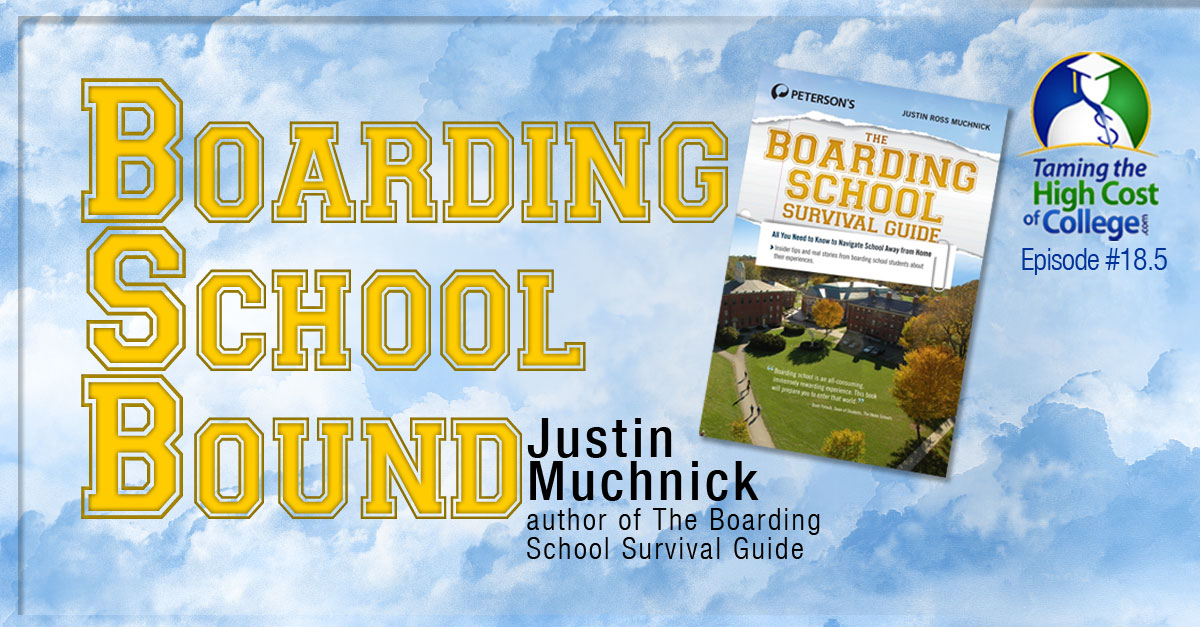
We’re taking the college planning process and backing it up about four years in today’s podcast as we talk with young author and student at Phillips Academy in Andover, MA. It’s a boarding school – one of about 300 across the country – that Justin Muchnick sought out as a grade school student.
As a seventh grader in California, Justin explained it was a literature teacher who incorporated discussion-driven learning that opened his eyes to the possibility of non-traditional education. The instructor was a writer-in-residence at Phillips-Exeter Academy, and Justin loved the debate and discuss approach, leading him to seek out his options outside of the standard high school environment.
Once at Andover, Justin wanted to help other students seeking answers about boarding school and realized he was just the person to author such a resource, and The Boarding School Survival Guide was launched.
What should readers expect from the book?
The Boarding School Survival Guide is made up of 25 chapters, authored by 25 different students from various boarding schools, and includes:
- Managing your time
- Living with roommates
- What to pack
- Acclimating at orientation
- Making the most out of a visit, or revisit
- Managing money
Justin said that because it’s peers writing the information, it helps readers see the boarding school experience through a student’s eyes.
What are the benefits of a boarding school education?
Justin pointed to the student environment of learning and being surrounded by peers who had a similar zest for learning as he did as a huge plus. It was also his fellow students that gave him an education in hearing and understanding different perspectives, from across the country and around the globe.
He said that half of the learning happened in the classroom, while the other half occurred in the discussions among students during their “off hours.”
The boarding school stereotype…fact or fiction?
Justin admits that he too had the same “rich, snobby kids” image of who attends boarding school, but the reality couldn’t have been farther from it. The more he became immersed in his studies, the more he realized that his fellow students came from all socio-economic backgrounds. The only constant was in their love of the rigor that the curriculum offered.
He also said that most boarding schools have large endowment funds which allow for generous financial aid offerings. (Andover’s admission policy is need-blind, meaning that acceptance is not based on your ability to pay.)
What is a typical day like?
Not unlike a typical high school, the school day runs from about 8 a.m. to 3 p.m. Justin said Andover requires each student to participate in an athletic activity after school, and after that it’s generally time to visit the dining hall. Evenings feature clubs and other activities, and of course, there’s study time. Weekends also feature school-sponsored events like dances and other social activities.
Other aspects of life at boarding school
- Dorms for freshmen are only for freshmen, and feature single rooms; after that housing options open up, al-lowing for students to room together, and even pick their roommates.
- Supervision – while mom and dad aren’t there, house counselors oversee the dorms and prefects or proctors, who are juniors, help guide students on and off campus
- Social relationships and dating are also allowed under the structure of curfews and lights out
What kind of student is ideal for boarding school?
Justin’s preference to learn in a more Socratic method (debate and discuss) was what drew him to boarding school, and he says that students who yearn for more rigor in their academics will find boarding school a good fit. A strong work ethic is also key, and because of the environment away from home, a certain independence and ability to stay disciplined is also important.
LINKS AND RESOURCES
Justin’s website
Phillips-Exeter Academy
Andover/Phillips Academy
Pick up a copy of The Boarding School Survival Guide
THANKS FOR JOINING US!
We’d like to extend an invitation to our listeners to share their feedback and questions. Our website offers a couple of ways for you to share your questions with us, and we’d love to hear from you.
Contact Us to submit a question to our email
Leave us a voicemail message on the computer! (We use questions for future shows because it’s likely other people have the same question.)
If you find our podcasts helpful, please share us on social media and tell your friends.
The bottom line is that we care what you think and want to help you out, so we’d appreciate you reviewing us on iTunes or on Spotify. And even better, receive automatic updates by subscribing to the show on iTunes or Spotify.
Sign Up for our Newsletter and receive our FREE reports!
- Get more need-based aid
- Find Scholarships
- Find a Great College at a Great Price
- Connect with other Parents and Students

